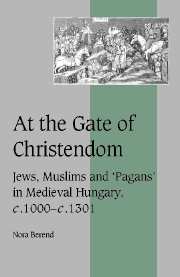Book contents
- Frontmatter
- Contents
- List of maps
- Acknowledgements
- List of abbreviations
- INTRODUCTION
- 1 HUNGARY: A FRONTIER SOCIETY
- 2 CHRISTIANS AND NON-CHRISTIANS
- 3 THE LEGAL POSITION OF HUNGARY'S NON-CHRISTIAN POPULATION
- 4 NON-CHRISTIANS IN HUNGARIAN ECONOMY AND SOCIETY
- 5 CONFLICTS BETWEEN THE PAPACY AND THE KINGS
- 6 CHRISTIAN PERCEPTIONS AND ATTITUDES
- 7 NON-CHRISTIAN COMMUNITIES: CONTINUITY, TRANSFORMATION, CONVERSION AND ASSIMILATION
- CONCLUSION
- Appendix 1 Hungarian kings of the house of Árpád
- Appendix 2 Toponyms, with Latin and German equivalents
- Appendix 3 The manuscript tradition of the Synod of Buda (1279)
- Bibliography
- Index
- Cambridge Studies in Medieval Life and Thought Fourth series
5 - CONFLICTS BETWEEN THE PAPACY AND THE KINGS
Published online by Cambridge University Press: 06 January 2010
- Frontmatter
- Contents
- List of maps
- Acknowledgements
- List of abbreviations
- INTRODUCTION
- 1 HUNGARY: A FRONTIER SOCIETY
- 2 CHRISTIANS AND NON-CHRISTIANS
- 3 THE LEGAL POSITION OF HUNGARY'S NON-CHRISTIAN POPULATION
- 4 NON-CHRISTIANS IN HUNGARIAN ECONOMY AND SOCIETY
- 5 CONFLICTS BETWEEN THE PAPACY AND THE KINGS
- 6 CHRISTIAN PERCEPTIONS AND ATTITUDES
- 7 NON-CHRISTIAN COMMUNITIES: CONTINUITY, TRANSFORMATION, CONVERSION AND ASSIMILATION
- CONCLUSION
- Appendix 1 Hungarian kings of the house of Árpád
- Appendix 2 Toponyms, with Latin and German equivalents
- Appendix 3 The manuscript tradition of the Synod of Buda (1279)
- Bibliography
- Index
- Cambridge Studies in Medieval Life and Thought Fourth series
Summary
Non-Christians in Hungary, as elsewhere in medieval Europe, were subject to local lay and ecclesiastical legislation, as well as to the papacy via Church councils and decretals. This chapter investigates the points of contention between Hungarian kings and the popes over the kingdom's non-Christians, the arguments and the vocabulary used by each side, and the role of local nobles and ecclesiastics in these conflicts. Policies over non-Christians (regulating, for example, usury or dress) were not the only controversial topics of concern to medieval kings and popes; debate erupted over many issues after the late eleventh century. The immediate causes varied, from the question of who could invest a bishop with the ring and staff, to whether a king could repudiate his wife, but they were all part of the underlying power politics between the pontiffs and the monarchs. By the thirteenth century issues of sovereignty played an important part in these power struggles.
To place papal conflicts with Hungarian kings in context, one should keep in mind that during the Middle Ages both ecclesiastical and royal policies contained elements of protection of and discrimination against non-Christians. Nor were ecclesiastical views uniform on this issue: popes, theologians or religious orders would at times adopt different approaches. The thirteenth-century papacy as a whole, as well as individual popes, often pursued the contradictory goals of ensuring the physical safety of Jews, while enforcing their separation from Christians, relegating them to a position of inferiority and condemning them as depraved, obstinate, treacherous, false and harmful to Christians.
- Type
- Chapter
- Information
- At the Gate of ChristendomJews, Muslims and 'Pagans' in Medieval Hungary, c.1000 – c.1300, pp. 149 - 189Publisher: Cambridge University PressPrint publication year: 2001



